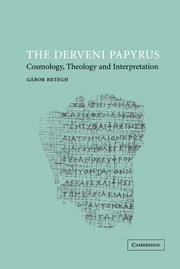Book contents
- Frontmatter
- Contents
- Preface
- List of abbreviations
- Text and translation
- 1 The find
- 2 The first columns
- 3 The reconstruction of the poem
- 4 The interpretation of the poem
- 5 The cosmic god
- 6 Cosmology
- 7 Anaxagoras
- 8 Diogenes of Apollonia and Archelaus of Athens
- 9 Physics and eschatology: Heraclitus and the gold plates
- 10 Understanding Orpheus, understanding the world
- Appendix: Diagoras and the Derveni author
- Bibliography
- Index verborum
- Index of passages
- Index of modern names
- Index of subjects
4 - The interpretation of the poem
Published online by Cambridge University Press: 23 December 2009
- Frontmatter
- Contents
- Preface
- List of abbreviations
- Text and translation
- 1 The find
- 2 The first columns
- 3 The reconstruction of the poem
- 4 The interpretation of the poem
- 5 The cosmic god
- 6 Cosmology
- 7 Anaxagoras
- 8 Diogenes of Apollonia and Archelaus of Athens
- 9 Physics and eschatology: Heraclitus and the gold plates
- 10 Understanding Orpheus, understanding the world
- Appendix: Diagoras and the Derveni author
- Bibliography
- Index verborum
- Index of passages
- Index of modern names
- Index of subjects
Summary
A bare reconstruction of the poem commented on by the Derveni author is still not sufficient for our purposes. In trying to evaluate the Derveni author's exegesis of the Orphic poem, we have to measure his interpretation against our own interpretation of the same text – or at least of what we have of it. This we can only do in a meaningful way if we have a relatively clear idea for ourselves about the theological and cosmological import of the poem. This, I suggest, requires us to go beyond the first level of the meaning, that is, beyond the mere literal meaning of the words and sentences, or the reconstruction of the succession of events the poem describes.
It should be obvious even from a first reading of the papyrus that the Derveni author is not making a bare summary of the plot of the poem, and his aim is not simply to paraphrase the literal meaning of the words and sentences. He states explicitly that, due to the peculiar, enigmatic nature of Orpheus' language, we cannot stop at a literal interpretation, as such an interpretation would not reveal the genuine meaning of the poet. Nevertheless, he sees clearly that his interpretation is not the only possible one. He constantly opposes his own reading to another interpretation which he ascribes to ‘the ignorant’. Now, the paraphrases of different passages of the poem he puts into the mouth of ‘the ignorant’ correspond exactly to what we would take as the literal meaning of the text.
- Type
- Chapter
- Information
- The Derveni PapyrusCosmology, Theology and Interpretation, pp. 132 - 181Publisher: Cambridge University PressPrint publication year: 2004

